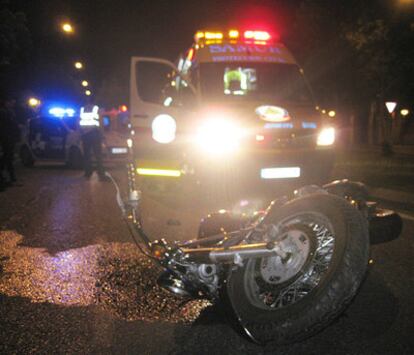If road safety is improving, why are more motorcyclists dying this year?
Campaigners blame state of highways for 12.5-percent fatality rise on 2010 figure
Bucking a 10-percent fall in overall road deaths over the last six months, the number of motorcyclists killed on Spain's highways rose during the same period by 12.5 percent. Official figures show that 144 motorcyclists died between January and 31 July, 16 more than during the same period last year.
"What looked like a random spike at the beginning of the year seems to be consolidating," says Juan Manuel Reyes, president of motorcycle insurance company Asociación Mutua Motera. But why is this happening? The increase in fatalities has the experts puzzled. Back in 2007, the worst year for motorcycle deaths since figures began, the sharp rise in sales amid what was then still a booming economy, was blamed. Sales fell by 12 percent last year, which should have had some impact. "Motorcycles have two uses: for fun and for transport. And in theory, because less people are working, and there is less money for leisure, there should have been a decline in deaths," says Reyes.
"With more motorcyclists on the road, there will be more accidents"
Campaigners insist the government is ignoring a serious public health issue
He says that the increase is worrying, coming after a three-year period that saw motorcycle deaths gradually decline. Pere Navarro, the head of the Directorate General for Traffic (DGT), the body that oversees road safety, describes the death of six motorcyclists in one weekend alone in June, as "outrageous."
The state organization says that reducing the number of motorcyclist deaths will be one of the main priorities of its 2011-2020 Road Safety Strategic Plan.
"The risk level is the same as it has been for several years," says Javier Rodríguez, an expert in road safety, and the former president of Asociación Lucha Motera, a group that campaigns for better conditions for motorcyclists.
Rodríguez argues that the current financial crisis has hit infrastructure spending: "With more motorcyclists on the road, there are going to be more accidents, it's that simple," he says, dismissing the idea that the crisis has actually reduced the number of motorbikes on Spain's roads.
Instead, he points to lack of investment in measures to improve road conditions for motorbikes, notably the use of a new generation of metal barriers, which have aprons running down to ground level as opposed to the majority, which are still placed on posts that can amputate limbs in the case of high-speed collisions.
"There is not a single case where a motorcyclist has died or suffered serious injury after hitting one of the new metal barriers," says Reyes. He blames the Public Works Ministry for not extending their use. "Of the ministry's two plans to improve the barriers, the first should have been finished in 2010, and the second hasn't even begun," he says.
In response, the Public Works Ministry says that the first plan, which cost 67.5 million euros and aims to install the new barriers on 1,600 kilometers of road, is now "81-percent complete." In the case of the second phase, which aims to cover a further 1,600 kilometers at a cost of 65 million, the ministry says that it has put out tenders in the case of 80 percent of the projects.
"The ministry has always been very aware about motorcycle accidents. This group represents less than one percent of total traffic on the nation's highways, but makes up 10 percent of accidents," the ministry says.
But motorcycle safety campaign groups insist that the government does not regard road accidents as a serious public health issue. "If they did, then we would not see cuts," they say.
But Reyes also accepts that a large number of motorcyclists lack proper training in road safety, particularly bearing in mind that 66 percent of accidents are caused by car drivers. "Passing your test does not mean that you know how to ride a bike safely: you have to learn how to deal with motor cars," he says.
At the end of last year, the DGT launched a campaign encouraging motorcycle users to take extra courses in safe riding, the first of its kind in Europe.
"The key to this is training," agrees Reyes. "Bikes are going to be used more and more, given their efficiency, mobility, fuel consumption, and reduced environmental impact."

Tu suscripción se está usando en otro dispositivo
¿Quieres añadir otro usuario a tu suscripción?
Si continúas leyendo en este dispositivo, no se podrá leer en el otro.
FlechaTu suscripción se está usando en otro dispositivo y solo puedes acceder a EL PAÍS desde un dispositivo a la vez.
Si quieres compartir tu cuenta, cambia tu suscripción a la modalidad Premium, así podrás añadir otro usuario. Cada uno accederá con su propia cuenta de email, lo que os permitirá personalizar vuestra experiencia en EL PAÍS.
¿Tienes una suscripción de empresa? Accede aquí para contratar más cuentas.
En el caso de no saber quién está usando tu cuenta, te recomendamos cambiar tu contraseña aquí.
Si decides continuar compartiendo tu cuenta, este mensaje se mostrará en tu dispositivo y en el de la otra persona que está usando tu cuenta de forma indefinida, afectando a tu experiencia de lectura. Puedes consultar aquí los términos y condiciones de la suscripción digital.








































